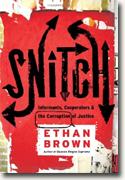Snitch
Ethan Brown
book reviews:
· general fiction
· chick lit/romance
· sci-fi/fantasy
· graphic novels
· nonfiction
· audio books
· author interviews
· children's books @
curledupkids.com
· DVD reviews @
curledupdvd.com
newsletter
win books
buy online
links
home
for authors
& publishers
for reviewers

 |
Snitch: Informants, Cooperators, and the Corruption of Justice Ethan Brown PublicAffairs Hardcover 273 pages December 2007 |
|
This book deserves to be read. Unfortunately, the issues are so complicated and often so confusing that even the author himself is sometimes led off the path. Drug and crime journalist Ethan Brown is obviously passionate on the subject of snitch laws and how they pervert the commission of justice in America. He's studied it and he wants to bring it to our attention, but it's a seamy world; describing the ins and outs of the flawed system seems to have exhausted Brown at times.
The basis of both these phenomena, at heart, is the vastly unequal sentences meted out for those who deal in crack and those who deal in powder cocaine. Most people realize that the cocaine dealers and users tend to be affluent and effectively above the law, able to hire smart lawyers and avoid jail time, whereas the crack dealers and users are nearly all poor ghetto blacks with few protective resources. Same drug, same crime, very different outcome. For the crack dealers, therefore, snitching has become a pernicious game. It is not surprising that someone accused of selling a minute amount of crack, facing a mandatory five-year jail sentence with no possibility of parole, will find a way to rat out someone, anyone, in order to escape lock-up. Brown is at his best when describing some of the obvious miscarriages of justice that have resulted from this twisted system. How did it happen that Ricky Davon Gray, a convicted armed robber who had bludgeoned his wife to death with an iron pipe, find himself free to go on a killing spree of such proportions that even he thought his life should not be spared? Brown resolves this question by reminding us that "Gray cooperated in a drug conspiracy case and received a 5K motion from a federal prosecutor." Back on the streets, he and a friend savagely murdered seven people in their homes, netting a "few stray items" and leaving one house in flames. Gray later commented about his crimes, "Something so simple became so complicated." Another frustrating legal debacle cited in the book was the attempt at entrapment of Euka Wadlington, a hardworking, well-liked man who wanted to run a nightclub in Clinton, Iowa. Targeted for a fall by Mark Thomas, a drug dealer involved in a large sting operation in Chicago, Wadlington was not susceptible to getting lured into a drug deal. But by a nasty curve in the 5K law and the willingness of several people to tighten the net around Wadlington to avoid their own punishment, Wadlington was arrested, tried and sentenced to two concurrent life sentences for dealing drugs in Chicago, two hundred miles away from his home, with no physical evidence produced against him. Apparently, according to Brown's sources, "When a federal prosecutor says, 'I represent the United States of America and this guy is a drug dealer,' that is a very powerful thing" in a jury's mind," so conviction rates are high (about 90%) and sentences harsh. Meanwhile, through the medium of rap music, those most vulnerable to harsh sentences are calling for an end to the inequality of the sentencing codes which would also put an end to the pervasive snitch network. Though Brown's Snitch Originally published on Curled Up With A Good Book at www.curledup.com. © Barbara Bamberger Scott, 2008 |
|
|
|
 Click here to learn more about this month's sponsor! |
|
| fiction · sf/f · comic books · nonfiction · audio newsletter · free book contest · buy books online review index · links · · authors & publishers reviewers |
|
| site by ELBO Computing Resources, Inc. | |
 The book hinges on two stark phenomena: Section 5K.1 of the Federal sentencing guidelines, offering greatly reduced sentences to snitchers; and the recent and easily misunderstood "Don't Snitch" movement among ghetto blacks, who are now pushing for the radical notion of having those who do the crime do the time.
The book hinges on two stark phenomena: Section 5K.1 of the Federal sentencing guidelines, offering greatly reduced sentences to snitchers; and the recent and easily misunderstood "Don't Snitch" movement among ghetto blacks, who are now pushing for the radical notion of having those who do the crime do the time.